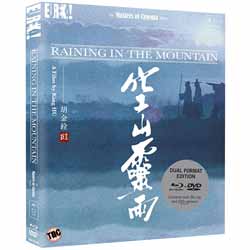|
Click here to return to the main site. Blu-ray Review
King Hu directed only fourteen films from 1963 to 1993 yet his oeuvre remains so revered and influential it’s hard to say today where his filmic imprint ends. Certainly the comic book epics live and breathe in the kingdom of King Hu and could not be conceived without his foundation and artifice. Marvel, DC, Empire all owe him, along with every successful movie from their cribs. When one pancakes it’s because its makers invariably have lost their King Hu. Guardians of the Galaxy: no forgetfulness there; Star Wars viral diarrhoea from the mouse’s bum: symptomatic amnesia due to King Hu deficiency. Wuxia (Wū-shä) is King Hu’s archetypal dramatic form (for more, see Review Graveyard on The Fate of Lee Kahn) with a clash of justice against evil, often violently converging in a central meeting place. Swordsmen and swordswomen spy and fight to attain what Hitchcock would call a “McGuffin” or symbolic object everyone wants to get their hands on. In Lee Kahn the sought after prize is a battle plan and the gathering place to seize it is a tavern. Here, the objet de désir is a talismanic scriptural scroll protected in a remote Buddhist temple, a document whose mere possession confers worshipful respect on the ruler who holds it. The ageing Abbot of The Three Treasures Temple (Su Han) asks three notable power players to help him determine his successor, Esquire Wen (Hui Lou Chen) a money bagging patron of the temple and its monastery; General Wang (Feng Tien) military commander and hero; and spiritual master, Wu Wai (Chia Hsiang Wu). Intrigues are fast and complex. Sedition is afoot. A poisonous wind has infiltrated the monastery. Beautiful White Fox (Feng Hsu) feigns being Esquire Wen’s concubine but is an astute thief and spy. Plunged into the morass of intrigue is a convicted criminal Chiu Ming (Lin Tung) disguised as a monk and committed to protecting the scroll. General Wang’s henchman, Lt Chang (Kuang Yu Wang) is an added surprise for Ming as it was Chang who framed him for the crime he did not commit. Retribution must follow. Three major battles occur, all with King Hu mastery. However it is the almost continuous ‘miniature action’ moments which are so engaging and, yes, awe inspiring. Characters are perpetually in the wrong place at the wrong time and running, ducking and improvising places to hide. An anonymous reviewer on IMDb notes, “Hu being behind the pen, behind the camera and apparently behind the editing as well, presents the entire film like a dance, no matter what they’re doing.” This is the truth of Hu’s auteur status and his key to the Olympiad of world cinema. Opera of sight. Eureka is on a mission here. A mission of cinematic love. With the release late last year of The Fate Of Lee Kahn and now Raining In The Mountain, the distributor is adding to its King Hu clutch (Dragon Inn, A Touch of Zen and Legend Of The Mountain) treating them all with state of digital art transfer and restoration, assembling a King Hu library, all equal to this one, with special features that inform and ennoble the whole legacy. It is a collection of gems, Caravaggio-lit as if a luminance is radiating from behind and within. The human motion therein is rhythmically worthy of a dance by Astaire and Rogers. The editorial pace is lean and light, a proverbial butterfly in Fibonaccian orbit around a bloom. These are great works of art and they deserve to be collected and handed down as home entertainment heirlooms. 10 John Huff Buy this item online
|
|---|

